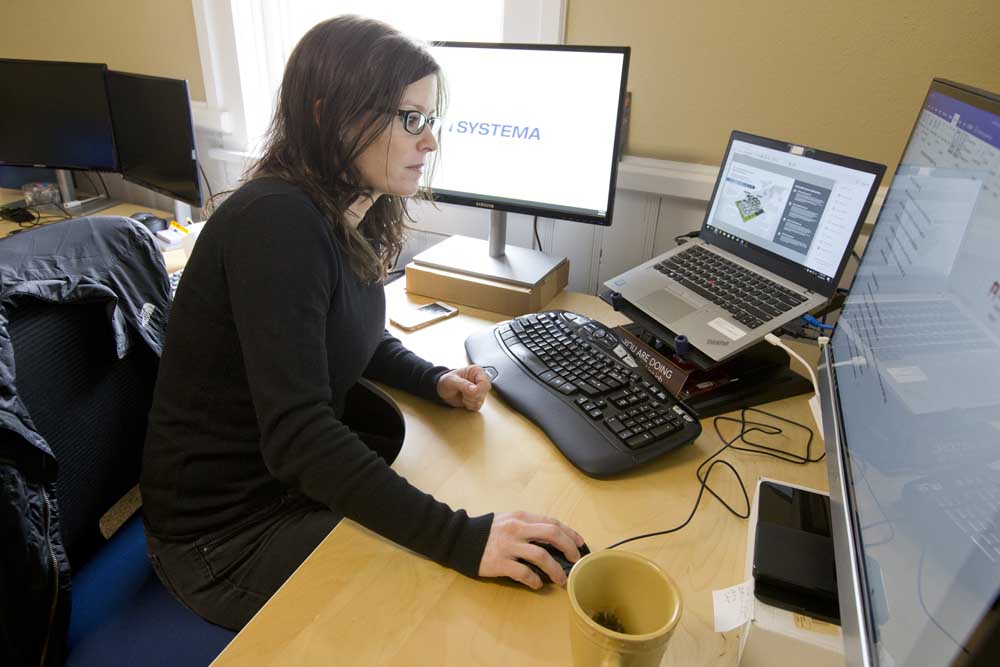OSU computer science graduates find jobs in Bend
Published 12:00 am Sunday, April 22, 2018

- OSU-Cascades 2017 computer science graduate Erin Peacock, a software engineer, works on inbound marketing for Systema USA in Bend.(Andy Tullis/Bulletin photo)
After finishing an internship with a Bend startup company in October, Erin Peacock considered taking the winter off for snowboarding.
But Yong Bakos, her former computer science instructor at Oregon State University-Cascades, persuaded her to take an interview at Systema USA, a German-owned company that helps manufacturers with automation. Peacock has been working as a software engineer in Systema’s Bend office since December.
“The U.S. office is a lot like a startup, which I love because it gives me an opportunity to do so many different things,” Peacock said.
Peacock is among a small but growing number of home-grown computer science graduates that OSU-Cascades is pushing toward Central Oregon employers hungry for software developers. Employers say OSU-Cascades graduates are trained according to their needs — they just want more of them.
Systema hired one other member of Peacock’s 2017 class, the first full class to graduate since the four-year computer science degree program launched in 2013. (One student completed the degree in 2016.) In fact, all 10 of the students who finished their coursework in the past 12 months have found jobs, and nine of them are in Central Oregon, OSU-Cascades spokeswoman Christine Coffin said.
Five more students are on track to graduate in June, and all of them are either already working or will have jobs when they graduate, Bakos said.
University officials are taking the job-placement rate as a sign that their computer science graduates meet the needs of local employers, who helped design the degree program back in 2010, Coffin said. The program emphasizes software development for the web and mobile applications.
The Bend web development firm Five Talent offered one 2017 graduate a job based on his performance during a capstone course project, in which Five Talent served as the client for a team of students. CEO Preston Callicott hopes to see other OSU-Cascades students progress from capstone project to paid internship to full-time employment.
“More importantly, how many more students are you going to graduate that fit the profile?” he said. “That’s really the nut of it.”
Central Oregon will have 236 jobs in software development by 2024, a 27-percent increase from 2014, according to Oregon Employment Department projections.
The Technology Association of Oregon estimated from a survey last fall that 31 companies in the region would need to fill 286 tech positions this year, and more than half of them would be in software development, said Teri Hockett, head of the association in Central Oregon. The association’s estimate, which accounts for turnover, has since grown to 500 tech jobs to be filled this year.
The OSU-Cascades pipeline is growing quickly, Bakos said. There are about 60 students enrolled in computer science, up from about 40 a year ago, he said.
Word is starting to reach high school graduates from Bend and students at Central Oregon Community College, he said. “COCC has experienced an explosion of enrollment, an explosion, in introductory computer science courses,” Bakos said.
OSU’s Bend campus is also gaining a reputation in Corvallis, which has the largest computer science degree program in the state with more than 1,000 students. Several have transferred to OSU-Cascades, Bakos said.
Early students like Adam Du Quette, who graduated in 2017 and works at Real Time Research in Bend, chose OSU-Cascades because it fit their situations. Du Quette said he was about to enroll at Portland State University when his wife landed a job in Bend in 2013. He did a Google search to find out whether he could even attend college here, found that OSU-Cascades was offering a computer science degree and went with it.
Du Quette said he enjoyed being part of a pioneering class and the networking opportunities that came with it. “The fact I could put ‘student’ as my title got me through a lot of doors and got me a lot of handshakes,” he said.
Peacock was in a similar situation. She had a 12-year career in banking, which she decided to leave in 2007. She had an opportunity to pursue a bachelor’s degree around the time that OSU-Cascades said it would be offering computer science. Peacock had always been drawn to technology, though she wasn’t sure what kind of work she would pursue with the degree. “I wanted to figure out what I could learn and what I was capable of,” she said.
Bakos wants OSU-Cascades to have a reputation beyond Central Oregon. “I want OSU-Cascades’ computer science program to be the best in the world,” he said. “I came here to reinvent computer science education.”
Bakos, who arrived in July 2016, said OSU-Cascades offers more hands-on learning opportunities than other universities and emphasizes professionalism from the start. Freshman students have to write a resume and create a portfolio site, which they’ll update over the years, he said. This year, the school is piloting professionalism as a component of the grading system, he said.
“We’re encouraging them to be in the workplace in the first quarter,” Bakos said. “I have multiple students working part-time for a startup. They’re freshman students.”
Gavin Briggs-Perez transferred to OSU-Cascades from Rutgers University in New Jersey and recently decided to pursue computer science, one of several majors he’d considered. “I feel like here I will get a better sense of how to be a computer scientist and a programmer in the professional world,” he said.
Briggs-Perez said he likes the fact that he can discuss his work with the instructors. At Rutgers, he said, computer science work is graded by an algorithm, and students are directed to teaching assistants.
Expecting to graduate in 2020, he hopes to find work in the Pacific Northwest, if not Bend.
Bakos said he’s taken it upon himself to connect students with local employers, and those connections helped several students land their first jobs. One was Du Quette, who got an interview at Real Time Research, which helps government entities with fish and wildlife research, after Bakos had lunch with Chief Technology Officer Mike Hawbecker.
“I call him the Fonz of OSU-Cascades,” Peacock said of Bakos. “He’s a cool guy, and he knows everyone.”
At some point, the college will have too many computer science students for Bakos to shepherd one-on-one, and he hopes that won’t be necessary.
“As those students become the professionals or business owners in the field, they’re building the relationships for us,” he said. “That’s why I’ve been a maniac coming out of the gate at Cascades. It’s urgent to plant that seed now.”
— Reporter: 541-617-7860, kmclaughlin@bendbulletin.com








